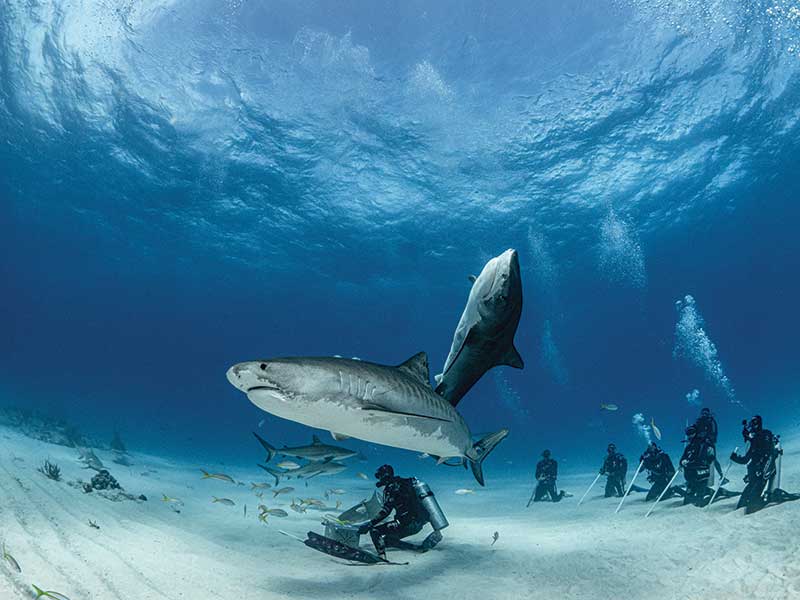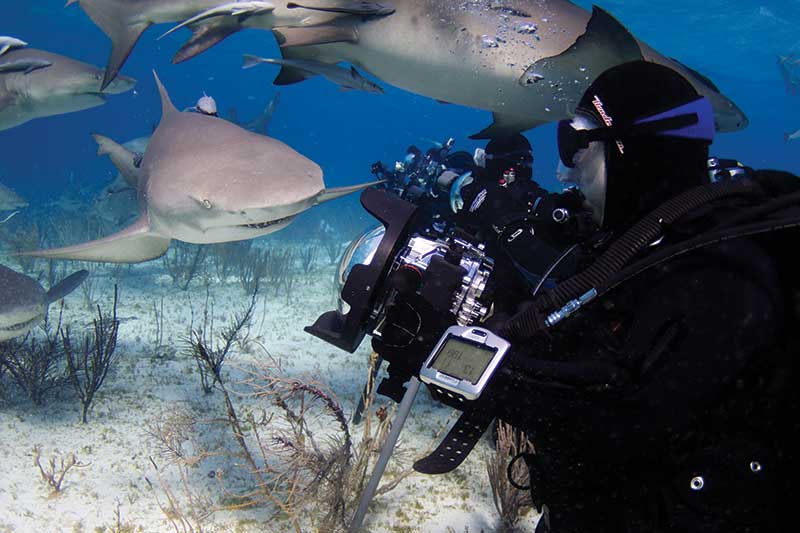Choosing a shark diving operator
Words by Cristina Zenato

As a firm believer that “one size does not fit all”, I’ll start my first column in DIVER by highlighting some of the considerations a diver should take before embarking on a shark diving trip. I’ll start with picking the operator.
As divers, we are responsible for our actions; simultaneously, we need to carefully consider the operators we choose for the different environments and shark species we decide to dive.
There are three core factors I always look at when evaluating an operator: the guests’ safety participating in the dive, the staff’s safety managing the dive, and the animals’ safety involved in the encounter. When the operator does not meet one of these three fundamental principles, I direct my choice elsewhere.
These considerations are related to an operator acting within the country’s legal regulations and the local laws regarding shark diving.
Diver safety
As divers, we are accountable for our diving skills; we need to manage our buoyancy, gas consumption, and bottom time. Still, when diving with sharks, we need to make sure the operator evaluates each diver’s capabilities before the dive. Some shark dives are in shallow, clear water; some are over bottomless ledges or strong currents. A responsible operator should check that the qualifications of each diver are compatible with the environment. The dive shop accomplishes this through a series of questions, followed by recommendations or a mandatory check-out dive in a spot where the staff can address problems and concerns without high risks. Operators mustn’t brush our questions and concerns as divers. They should advise on a dive’s feasibility for a specific participant, even if this means postponing it or adding one safety guide. It’s important to check how many people they put in the water at any given time and the ratio of safety divers to divers according to the various locations and species. I recommend picking an operator that has been in the area for quite some time and regularly conducts dives in the same place. Additionally, I always advise people to pick local operators who are using local resources and providing local jobs. Shark diving tourism is a great way to protect sharks by giving them value as live animals. If the money is not distributed within the local communities and benefits only those coming in from the outside, using foreign resources and provisions, the locals will not find enough reasons to want to protect sharks.
It’s also important to look at the operator’s safety record, both towards divers and animals. Have they experienced incidents before? Reach out to the operator and ask questions; a good operator will reply to them and address concerns. Ask if they provide a safety briefing with educational components. We can detect an operator’s tone from the words they use in their advertisement: if they use cliché or scary words to hype up the shark encounter, we might decide that this is not a good fit. Ask about the dive location, distance from shore, emergency procedures, and evacuation protocols in the unlikely event of an accident. Operators who are attentive to their guests’ and staff’s safety will also provide rules to abide by before, during, and after the dive. If the operator has a few to no limitations and does not control the divers, the risk increases for all those involved.

Staff safety
Ideally, the operator has a specific team adequately trained to work with sharks, who can provide guidance to the divers and assist with issues while handling all scenarios. The methods used to attract sharks and the requirements placed on the crew are points to observe. Depending on the species of sharks and the location(s), the parameters of evaluation will change. Still, we should see if the crew is left to conduct dives without the essential safety gear to handle the species or the correct tools to address all the issues and the training necessary to respond. We want a trained and licensed crew to dive with us, Dive Masters or higher, versatile in rescue and EFR techniques. They should be familiar with the sharks we are diving with and their behaviour. If a trainee is present on the dive, he/she should not be directly responsible for the guests’ safety or the handling of the sharks without additional experience or a senior member supervising the activity. The staff should be able to answer our questions about the species we will be diving with, especially in terms of behaviour and reactions to our presence; they should also be able to assure those individuals with safety concerns without downplaying their fears. A prudent operator will also consider the weather and make decisions that might be unpopular with some divers, such as delaying or cancelling the interactive dive due to unfavourable conditions, from rough oceans to strong current and lower visibility.
Shark safety
Protecting the sharks primarily comes from satisfying the two points above. If we protect the people and we protect the staff by making sure that proper procedures are in place, the risk of having incidents is significantly reduced, consequently lowering the risk of negative encounters and press for the animals involved. An operator who has the safety of sharks in mind will provide a balanced educational briefing, explaining the possible risks and the positive outcome of these encounters. The operator will guarantee that the food source to attract the animals is safe and sustainable, without using threatened species, and provides nutritional value. One of the best evaluation methods is to analyze the interactions with the sharks. Search this through social media posts, the operator’s posts, and read some of the reviews of other divers. Interactions should highlight the beauty of these creatures and not create unnecessary stress and agitation during the dive. One of the things I pay a lot of attention to is the container used to distribute the food. I am a believer in the concept of “control the food, to control the sharks”. The food holder should not damage the animals if they contact it, but it shouldn’t disintegrate either.
Ultimately, we need to keep in mind that we are all different and diving at different levels. What’s acceptable for some might not be for others, so observations and research need to be based on common sense. If an operator does not feel right, it’s best to avoid the trip altogether and find a better-suited location and venture.
Cristina Zenato is a member of the Women Divers Hall of Fame, The Explorers Club, and the Ocean Artists Society. She has been diving with sharks for the last twenty-five years and has been instrumental in pushing forward an image of sharks that shows their real nature. For more on Cristina visit: www.cristinazenato.com







